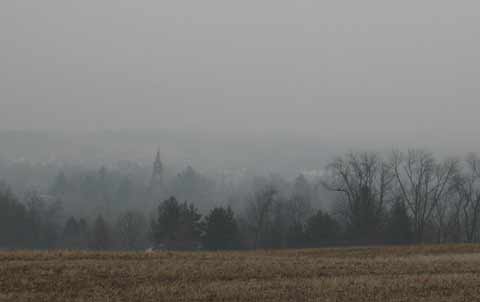Double faces of Jos harmattan
The environment looks hazy and everybody feels the impact of the surroundings due to a gentle wind breezing around. Every year from December to January, the temperature is cool and gradually becomes cooler especially in Jos and its environs. This year, the story has not changed as the condition is biting harder with residents finding […]

Weather predictions
The environment looks hazy and everybody feels the impact of the surroundings due to a gentle wind breezing around. Every year from December to January, the temperature is cool and gradually becomes cooler especially in Jos and its environs.
This year, the story has not changed as the condition is biting harder with residents finding ways to cope with the condition.
- Oyetola reconstructs 13.15km Ada-Igbajo road after 30-year neglect
- Insecurity: You can’t afford to let Nigeria down, FG tells army
Due to the current situation of the weather, many Jos residents delay going out in the morning for their usual activities.
Similarly, in the evening residents also run to their houses earlier than usual due to the current condition of the city.
To protect themselves against the cold weather, many residents wear different kinds of cardigans or sweaters to keep their bodies warm. Some warm their bodies under the sun while others make charcoal fire to have the relief of the harmattan.
Onoja Desmond Sunday, Head of Hydrology and Climate (water Resources) unit at National Centre for Remote Sensing, Jos, explained why this year harmattan was harsh in Jos.
He said: “Just like it has been, Jos is known for its cold weather right from time immemorial because of its height and location. That gives it an advantage over other areas.
“Secondly, this drastic change in the harmattan, we can interpret it to the function of a climate change coupled with the anthropolic activities such as the cutting down of trees among others that are taking place over time.
“The cold air dry that comes from Sahara desert to Jos at this period is being affected by lapse rate which is an atmospheric variable. Normally, temperature in the earth atmosphere comes with altitude (the higher you go, the cooler it becomes). Jos is located at an altitude of about 1829m above the sea level,” Sunday added.
The expert said Jos’ weather was still not as cold as the early fifties( 50’s) and sixties (60’s) because of the effect of climate change on our present-day environment .
The economic benefits of Jos harmattan
Our correspondent reports that amidst the cold temperature, lots of economic activities, especially those selling sweaters, jackets and charcoal are experiencing a boom in their trade.
According to a wholesaler of second hand clothes in Jos, Zaharaddeen Muhammed, during harmattan, they experience lots of sales.
He said: “We experience a boom in the market because people partronise sweaters, jackets and other categories of clothes usually worn during harmattan. Besides that, Plateau uses more second hand clothes than any other state in the northern part of Nigeria. People from other parts of the region also come to Plateau to buy second hand clothes even after the harmattan. We are really enjoying the market.”
The market is also booming for those selling charcoal as residents buy the products despite an increase in its price.
Tea sellers who also enjoy the season said they have more patronage during harmattan than other periods.
